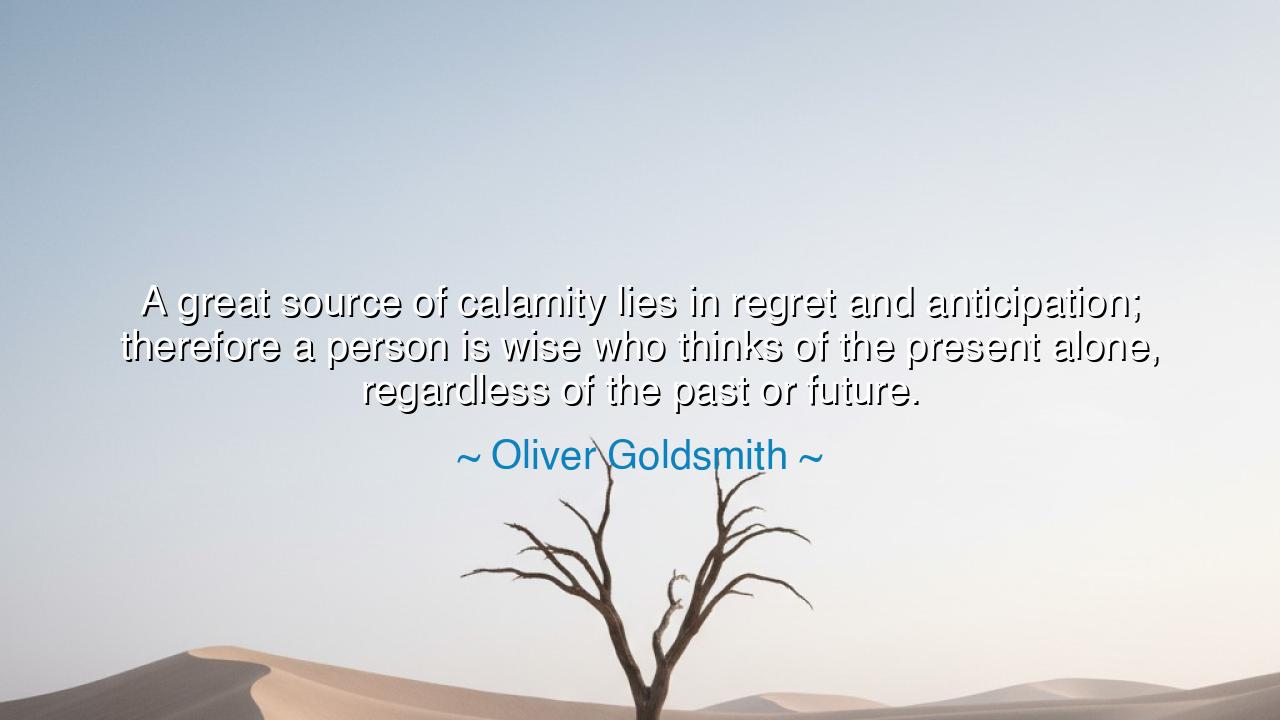
A great source of calamity lies in regret and anticipation;
A great source of calamity lies in regret and anticipation; therefore a person is wise who thinks of the present alone, regardless of the past or future.






“A great source of calamity lies in regret and anticipation; therefore a person is wise who thinks of the present alone, regardless of the past or future.” — thus wrote Oliver Goldsmith, the poet, essayist, and philosopher whose words have long echoed with the music of gentle truth. In this single sentence, he captures the timeless struggle of the human heart — the battle between what has been, what may be, and what is. Goldsmith’s teaching is simple yet profound: that wisdom lives only in the present, and that the twin forces of regret and anticipation — the sorrow of yesterday and the fear of tomorrow — are thieves that rob the soul of peace.
Goldsmith lived in the eighteenth century, an age of reason and reflection, yet his words transcend his time, speaking directly to the eternal condition of man. He had known hardship and uncertainty himself — a wandering scholar, often poor, yet rich in insight. Through his travels and struggles, he came to understand that much of human misery is self-inflicted: not by the blows of fate, but by the mind’s refusal to rest in the moment given. He saw that people are forever haunted by what they cannot change — the ghosts of past mistakes — and forever anxious about what they cannot know — the shadows of the future. Thus, his counsel was not born from idle philosophy, but from lived experience and quiet observation: peace is not found in time remembered or imagined, but in time inhabited.
To say that “a person is wise who thinks of the present alone” is not to encourage thoughtlessness or neglect of responsibility. It is to remind us that the present — this breath, this heartbeat, this sunrise — is all that truly exists. The past is memory, the future, imagination. The wise do not waste their strength chasing ghosts or fearing mirages; they plant their energy in the solid ground of now. When we learn to dwell fully in the present, regret loses its grip and anticipation its poison. The mind grows still, and the heart becomes light.
Consider the life of Marcus Aurelius, the philosopher-emperor of Rome, who, surrounded by war and intrigue, wrote his meditations on serenity. He too warned that man’s suffering comes not from what happens, but from his judgment of it, from his obsession with past and future. In the midst of empire and turmoil, he found peace not in conquest, but in presence — in meeting each moment as it came, with clarity and purpose. Goldsmith’s wisdom is of the same spirit: that strength of soul lies not in changing the tides of time, but in learning to float upon them with grace.
Regret, Goldsmith teaches, is a chain that binds the soul to what cannot be undone. It is the mind’s cruel trick, turning memory into punishment. The past is not the enemy — it is the teacher. To dwell upon it is to refuse its lesson. Likewise, anticipation, the endless worrying of what may come, is the child of fear. It steals joy before sorrow has even arrived. Together, these two — regret and anticipation — weave the net in which so many hearts are caught, unable to move freely through the beauty of the present. The wise, by contrast, walk unbound. They remember, but do not cling; they plan, but do not fret.
This philosophy is not cold detachment but radiant freedom. To live in the present is to see life as it is, without distortion — to taste the sweetness of each moment, to act rightly with full attention, to love deeply without fear of loss. It is the art of being alive rather than merely existing. When the mind quiets its endless wandering through time, the soul awakens to the miracle that every instant is new, unrepeatable, and full of possibility.
Lesson: Do not live in the ruins of yesterday, nor in the dreams or dreads of tomorrow. Rise each day and meet it as though it were your first and last. When memories stir, learn from them but let them go; when worries whisper, answer them with action, not fear. Practice the art of presence — breathe, notice, and act with sincerity in all things. For in the stillness of the present, the heart finds peace, and the spirit finds freedom.
Thus, Oliver Goldsmith’s words endure like a quiet bell across the centuries: “A person is wise who thinks of the present alone.” The world may pull you backward and forward, but wisdom calls you here — to this moment, this breath, this life. Live it wholly, for it will never come again.






AAdministratorAdministrator
Welcome, honored guests. Please leave a comment, we will respond soon